Dr. James Alison is a Roman Catholic priest, theologian, and author of several books. He currently lives in São Paulo, Brazil.
James was born in London, England in 1959 to Michael and Sylvia Mary Alison. James has two younger siblings, and his parents were conservative evangelical Anglicans. As a young child he was sent to a conservative religious boarding school in England. The Bible was one of the books approved for students to read in their dormitories, and James spent some of his free time at night reading bible passages. While he was reading the Bible he could understand for himself that the scripture spoke about love, in contradiction to the interpretations and messages he was getting from his environment.
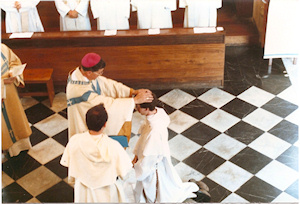
Ordination, July 12, 1978In his early childhood years he began to understand that he was gay. At the age of nine years old he fell in love with one of his classmates (not reciprocated) and found himself exploring an intuition of Christianity and the Bible as well as the realization that he was gay. This was the beginning of his understanding throughout his life that his Christianity, and sexuality are intertwined with one another. However, because of the teachings of church and school that gay people were evil abominations, he remained silent about his inner feelings. At the age of 12, at a different school he fell in love with a classmate who was Catholic. His classmate exposed him to, and talked to him about Catholicism. James felt that it opened up a spiritual world with a bigger space in it for him. The Catholic teachings about nature and grace gave him hope in what he felt and believed in. As his father became aware that he was becoming interested in Catholicism, he instructed the teachers and staff at James’ school to keep him away from Catholic teachings and practices.
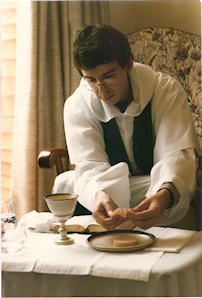
First Mass, July 12, 1978At the age of 18 in 1978 during the gap year for British students between high school and college, James lived and worked in Bogotá, Colombia. He had been hired for an internship with the Thomas de la Rue printing company. During Holy Week and Easter James decided to go on a short visit to Cali and attended Good Friday services at a Catholic Cathedral. While there he prayed fervently to be made straight. Once home in Bogotá, and during a bus ride to work, he was filled with a sudden and overwhelming joy. He realised that his prayer had been answered: not to be made straight, but that God was filling him with the acceptance of himself as gay. This experience of pure and huge joy lasted several days.
He then returned to England, and when he had reunited with his parents he came out as gay to them. His family lived in Earls Court, at that time a very gay neighbourhood, and James went through a period of difficult months emotionally and financially after coming out to his parents. He realized after coming out that he did not have a stable support network or community to rely on, and very little connection to other gay people or LGBT community.
Later in 1978, and following on a further invasion of joy which James attributes to Padre Pio, he went to a Catholic cathedral and asked the priest for instruction and support in converting to Catholicism. He then went on to continue his studies at New College of Oxford University in England. The following two years of study were incredibly tough for him, and characterized by periods of severe depression and suicidal thoughts. In 1980 he embarked on his student exchange year abroad in Mexico City, Mexico.
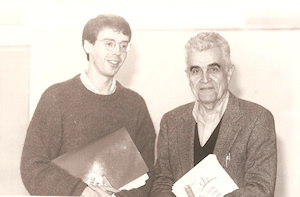
With René Girard in Piracicaba,
June 1990While in Mexico he connected with the Dominicans, a Catholic religious order. He decided to join their religious order starting his postulancy and novitiate there at the age of 22. His novice master there was Raul Vera, now the Bishop of Saltillo, who has of late grown into a strong gay ally in Mexico. In 1983 he left Mexico and retuned to England where he joined the Dominican house of formation at Blackfriars in Oxford.
During this time he was mentored and taught by a variety of significant Dominican thinkers including Simon Tugwell, Herbert McCabe, Timothy Radcliffe, Fergus Kerr, Roger Ruston and others.
In 1987 he decided to continue his theological studies at the Instituto Santo Inácio (now Faculdade Jesuita) in Belo Horizonte, a Jesuit school, in Brazil. During his time there the AIDS epidemic began to grow, and James was engaged in pastoral work with patients dying of AIDS. He worked in these ministries from the age of 27 to 31 years old. At this time in the late 1980’s, over 80% of the patients with AIDs in Brazil died within the first five months of their first symptom.
While in this ministry, he met a man named Laércio and fell in love. Soon after he had to leave the country but they stayed in relationship with one another long distance between 1990 and 1994. Laércio was then diagnosed with HIV. James traveled back to Brazil in November 1994 to finish defending his doctoral thesis. Laércio died soon after. In his grief James came to understand the goodness of the ordinariness of the love between them in spite of the internalized homophobia he had been struggling with.
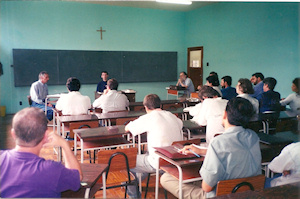
Doctoral Thesis, Belo Horizonte,
November 1994Between 1994 and 1995 after years of attempting to be truthful within the Dominican order, James realized that his belonging to that order was null, dependent in his case on the false premise of gay people being objectively disordered and thus celibacy being obligatory. He eventually returned to England and moved in with his parents. This was a difficult time for all concerned because of the differences within his family both because of his sexuality, and because of their different religious and political commitments.
In 1999 he was hired to work in Chile, for a Swedish newspaper as a translator and company representative. At his time he had completed several books and gave talks on his writings in San Francisco, Mexico, and various countries in South America. In 2008 he was approached by Peter Thiel of the René Girard foundation and offered a fellowship. Throughout his previous studies and writing James had brought together the anthropological theory of René Girard with Christian systemic theology. This fellowship awarded him enough money to continue his work on the intersections of Girard’s work with Christianity and theology and helped him reach financial stability. He began to give talks to various gay groups in Bogotá, Mexico City, and Santiago.
He moved to live in Brazil and travel around the world speaking to various academic, Christian, Catholic, and LGBT groups on his work and writings. While in Brazil he also met a young man, and they grew to love each other very much. The young man had a very traumatic childhood and young adulthood, and James offered to be family and a father to him. They decided to become family to one another, and he agreed to be adopted by James. James now has a (canine) grandson through his son as well.
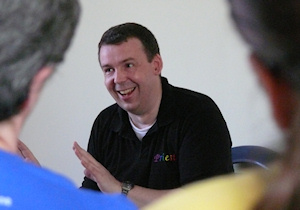
Teaching in Malta, 2007His current work includes his position as a Fellow and chair of the Education Committee of Imitatio, an organization that supports the education and development of scholarship related to the Mimetic Theory of Rene Girard.
He has published a variety of books and resources including: “Knowing Jesus”, “Raising Abel”, “The Joy of Being Wrong”, “Faith beyond resentment: fragments catholic and gay”, “Undergoing God”, “Broken Hearts and New Creations: imitations of a great reversal”, and more.
He is also the author of, “Jesus the forgiving Victim”, a DVD based introduction to the Christian Faith for adults based on the work of Rene Girard.
James believes that Christianity is about God making human beings, “gloriously alive”. He sees that when LGBT people can practice self-acceptance and pride in their happiness with which they are, that it spills over into the rest of the world and people around them.
Biography Date: March 2014